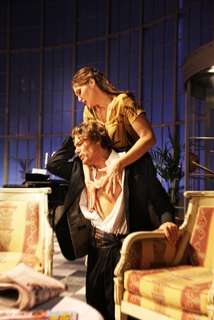|
Back
Accessible, amusing, and ambiguous Copenhagen
The Royal Danish Opera House, Main Stage
10/11/2011 - October 14, 16, 18*, 21, 23, 25, 27, 29, October 1, 3, 5, 8, 22, 24, 26, 28, November 4, 11, 2011
Wolfgang Amadeus Mozart: Così fan tutte, K. 588
Inger Dam-Jensen*/Myrtò Papatanasiu/Karine Babajanyan (Fiordiligi), Elisabeth Jansson (Dorabella), Palle Knudsen (Guglielmo), Peter Lodahl/Emilio Pons* (Ferrando), Lina Johnson (Despina), Johan Reuter (Don Alfonso)
The Royal Danish Opera Chorus, Philip White (chorus master), The Royal Danish Opera Orchestra, Daniele Callegari (conductor)
Guy Joosten (director, lighting designer), Johannes Leiacker (set designer), Karin Seydtle (costume designer), Ivan Munro (lighting designer)

E. Jansson & P. Knudsen
(© Miklos Szabo/Courtesy of Royal Danish Opera)
In Guy Joosten’s interpretation of Così fan tutte, comic moments are cultivated throughout without losing the underlying seriousness of the inner conflicts of the sisters and their beaus as they venture into temptation and ultimately realize their own foibles and responsibility in what comes to pass. Johannes Leiacker (set designer)’s elegant 3-story somewhat Art-Deco atrium with a glass façade looking out towards a vociferous Vesuvius is a hotel bar lobby with sensual paintings on the walls, a broad carpeted stairway leading to the rooms, and holiday guests and hotel employees constantly coming and going.
As easily as the stairs and kitchen door of the set switch from right to left in Act 2 - a mirror imaging of the architecture - the couples switch partners. Rather late in the game, the sisters recognize the trick that has been played on them. And how have they not recognized their former partners from the moment the Italian slicksters make their appearances? Well, we take it with a grain of salt or assume something else. Fortunately, Mozart’s exquisite arias, duets and trios convey to us the love sickness, the wooing, the worrying, and the cynicism of the six protagonists. All of the soloists were able to meet the vocal challenge of nearly 3 hours of focused recitative and singing in an opera with relatively few choral interludes.
Emilio Pons (Ferrando) was interesting in the role as the more serious and ingenuous of the two young men, and he sang convincingly with a competent bright tenor voice, especially in the arias "Un aura amorosa" and "Ah lo veggio". He seemed more capable of loyalty and better suited to the more serious, regretful Fiordiligi than her easily distracted sister.
Inger Dam Jensen (Fiordiligi) impressed with her lovely soprano and skilled presentation, particularly her rendition of "Per pietà, ben mio, perdona", which she sung with heartfelt regret and recognition of an inexplicable undertow of attraction as she is drawn toward the sweet Ferrando, seemingly the opposite of her worldly wise former beau Guglielmo.
Perfect for the part, Palle Knudsen (Guglielmo) played a lover-boy type who was full of himself, aware of his own physical attractiveness, and sure that no woman can throw him over for another. With his rich baritone, comic diversions, well-toned arms and shoulders, Knudsen is an exotic figure that young Dorabella cannot resist from the moment she sees him shirtless in Act 1.
Elisabeth Jansson (Dorabella) was a lovely and willing conquest for Knudsen, in love with love from the start and soon initiated in the depths of erotic attraction. She can’t wait to get her new flame upstairs and into bed. Jansson also showed off talents as a comic actress and delivered her arias with a dark, rich, and sensual voice.
Lina Johnson (Despina) displayed great charisma in her role, performing with a high soprano soubrette and a pretty figure and face that are assets for any production. She contributed to the comic dimension whenever on stage, for example, holding fast the revolving doors to prevent the boyfriends from entering the hotel at the wrong moment or banging the kitchen door each time she left the stage.
Johan Reuther (Don Alfonso), who started all the heartache and confusion with a cynical bet, enjoyed playing the master manipulator. His persona was always nearby, sometimes disappearing into the busy hotel scene, but reappearing at critical moments to push the young ladies towards the outcome he desired. Reuther’s fine baritone and genial performance confirmed again the solidness of the Royal Copenhagen Opera soloists.
Daniele Callegari (conductor) kept the tempo animated, as must be with Mozart, and looked out for the soloists, and the Royal Danish Opera orchestra played well. I did miss, however, the old theater on Kongens Nytorv that always seems to inspire musicians to a more intimate harmonious kind of playing of older operas, and hopefully this alternative venue will still exist the next time we are treated to a Mozart work.
Still, it was a wonderful 3 1/2 hours in great company, amusing and easily accessible for all.
Kathleen Gail Jensen
|